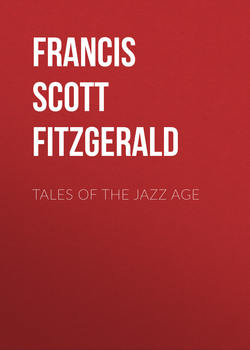Читать книгу Tales of the Jazz Age - Френсис Скотт Фицджеральд, Francis Scott Fitzgerald, Френсис Скотт Кэй Фицджеральд - Страница 14
MAY DAY
III
ОглавлениеAbout nine o'clock of the same night two human beings came out of a cheap restaurant in Sixth Avenue. They were ugly, ill-nourished, devoid of all except the very lowest form of intelligence, and without even that animal exuberance that in itself brings color into life; they were lately vermin-ridden, cold, and hungry in a dirty town of a strange land; they were poor, friendless; tossed as driftwood from their births, they would be tossed as driftwood to their deaths. They were dressed in the uniform of the United States Army, and on the shoulder of each was the insignia of a drafted division from New Jersey, landed three days before.
The taller of the two was named Carrol Key, a name hinting that in his veins, however thinly diluted by generations of degeneration, ran blood of some potentiality. But one could stare endlessly at the long, chinless face, the dull, watery eyes, and high cheek-bones, without finding suggestion of either ancestral worth or native resourcefulness.
His companion was swart and bandy-legged, with rat-eyes and a much-broken hooked nose. His defiant air was obviously a pretense, a weapon of protection borrowed from that world of snarl and snap, of physical bluff and physical menace, in which he had always lived. His name was Gus Rose.
Leaving the café they sauntered down Sixth Avenue, wielding toothpicks with great gusto and complete detachment.
"Where to?" asked Rose, in a tone which implied that he would not be surprised if Key suggested the South Sea Islands.
"What you say we see if we can getta holda some liquor?" Prohibition was not yet. The ginger in the suggestion was caused by the law forbidding the selling of liquor to soldiers.
Rose agreed enthusiastically.
"I got an idea," continued Key, after a moment's thought, "I got a brother somewhere."
"In New York?"
"Yeah. He's an old fella." He meant that he was an elder brother.
"He's a waiter in a hash joint."
"Maybe he can get us some."
"I'll say he can!"
"B'lieve me, I'm goin' to get this darn uniform off me to-morra. Never get me in it again, neither. I'm goin' to get me some regular clothes."
"Say, maybe I'm not."
As their combined finances were something less than five dollars, this intention can be taken largely as a pleasant game of words, harmless and consoling. It seemed to please both of them, however, for they reinforced it with chuckling and mention of personages high in biblical circles, adding such further emphasis as "Oh, boy!" "You know!" and "I'll say so!" repeated many times over.
The entire mental pabulum of these two men consisted of an offended nasal comment extended through the years upon the institution – army, business, or poorhouse – which kept them alive, and toward their immediate superior in that institution. Until that very morning the institution had been the "government" and the immediate superior had been the "Cap'n" – from these two they had glided out and were now in the vaguely uncomfortable state before they should adopt their next bondage. They were uncertain, resentful, and somewhat ill at ease. This they hid by pretending an elaborate relief at being out of the army, and by assuring each other that military discipline should never again rule their stubborn, liberty-loving wills. Yet, as a matter of fact, they would have felt more at home in a prison than in this new-found and unquestionable freedom.
